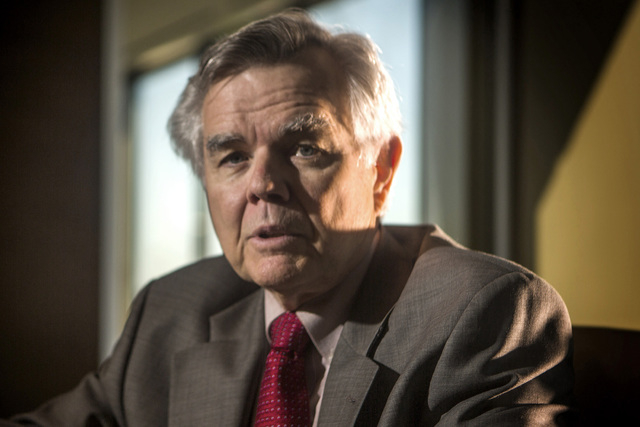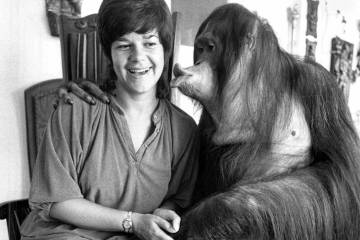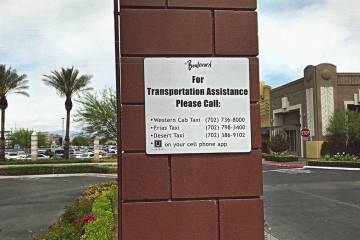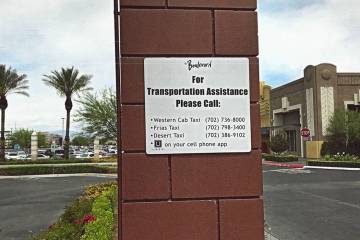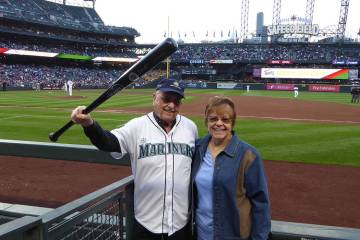For Terry Care, it was about policy, not partisanship
Political journalists often think they are smarter than politicians and could do a better job. Think Jon Ralston and Steve Sebelius. And me, sometimes.
But newsman Terry Care didn’t just bloviate. He put his smarts on the line, proving that he could do a better job than many lawmakers.
Care, 68, had worked for radio stations, the Valley Times newspaper and two Las Vegas television stations before turning to law, and then politics in 1998.
During his 12 years as a state senator, he earned a reputation as a thoughtful lawmaker who could see the unintended consequences in poorly written bills. The moderate Democrat fixed problem bills and found solutions. He was one of the good guys in the Legislature.
Care’s colorful career, from disc jockey in Bangkok to respected attorney, was recalled Feb. 20 at a retirement party hosted by his law firm, McDonald Carano Wilson, and packed with people on both sides of the aisles. He was described as a man of integrity, and speakers compared him to Jimmy Stewart in “Mr. Smith Goes to Washington,” Atticus Finch in “To Kill A Mockingbird” and Will Rogers, who famously never met a man he didn’t like.
Of course, there was the governor who said his work was chickenshit.
When Care was at the Valley Times, he once wrote a story about the late U.S. District Judge Harry Claiborne and whorehouse owner Joe Conforte.
The day it ran, he received an early-morning phone call from former Gov. Mike O’Callaghan, then a honcho at the Las Vegas Sun known for his candor and his early-morning calls.
The blunt-spoken O’Callaghan started by saying: “I read your story this morning, and I think it’s chickenshit,” Care recalled after O’Callaghan’s death. But while O’Callaghan started out rough, Care remembered that the conversation ended with O’Callaghan saying, “Well, I always enjoy talking to you, soldier to soldier.”
When Care was asked about his major accomplishment as a journalist, he did not puff himself up or tell of going nose to nose with mobsters back in the day.
He cited this one: When he was news director at Channel 13, he brought Paula Francis from Wisconsin to Las Vegas. She was hired away by Channel 8 and for decades has been one of the most popular anchors in Las Vegas.
Care’s mob stories were funny, not chilling. Like when he first came to work in Las Vegas in 1979 and suggested to his boss he try to help the guy with the worst show on TV. “Don’t you go near him,” his boss commanded.
The television host with the terrible show that Care had wanted to help was mob associate Frank Rosenthal.
Care also remembered interviewing mob lawyer Morris Shenker at his office in the Dunes after FBI tapes from Kansas City were released alleging political corruption in Las Vegas.
Shenker, flanked by some tough- looking men, became angrier and angrier at Care’s questions, and finally the then-television reporter decided to stop. Shenker asked if the microphone was off, and Care said yes.
Then Shenker broke into a big friendly smile and said, “When will this be aired?”
The anger had all been for show.
When Care, by then an attorney, was considering running for the state Senate in 1998, he turned to O’Callaghan for counsel. The former Democratic governor urged him to go for it.
Care ran, he won and was declared the best freshman in 1999 in a Las Vegas Review-Journal poll. “I didn’t come up here with an agenda, other than doing the right thing,” he said then. You knew he meant it. He was praised for his sense of willingness to work with others and his thoroughness.
As a lawmaker, Care followed the journalist’s creed “Question Authority” and didn’t kowtow to bigwigs. In 1999, when Steve Wynn wanted a tax break on his art collection at the Bellagio, he got it. But Care voted against it.
In 2001, Care sponsored a bill requiring that for an action to pass, any government body had to have a majority of the entire body, not just a majority of the people present. That stopped a sneaky little game whereby politicians would abstain on important legislation, oh, say on the County Commission, and it could pass with just a few votes instead of four votes.
For example, a controversial bill governing neighborhood casinos had passed 3-2 because two others abstained. He successfully advocated for a consumer protection bill to protect people from shoddy pool contractors. And when a friend told him about his deaf baby, Care put in a bill requiring all newborns have their hearing tested to help parents realize there was a problem and take corrective action.
Wonder how much public bodies spend settling cases and how much the lawyers nabbed? Care’s bill AB277 made that public record.
“These are taxpayer dollars at work here, and they (the public) have a right to know how much of their money is being spent to settle cases,” Care said at the time. “And they also have a right to know how much of the money is being spent on attorneys.”
Many of my own encounters with Care occurred during his term as chairman of the Nevada Democratic Party during the 2002 elections.
Those were miserable years for Nevada Democrats. They couldn’t find a viable candidate to challenge the hugely popular incumbent Kenny Guinn. Although it was not publicly known at the time, two of their “stars” were Clark County commissioners under investigation for political corruption — Dario Herrera running for Congress and Erin Kenny running for lieutenant governor.
When the teachers’ union endorsed Guinn in April 2002 and the Democrats still didn’t have a candidate, I was the newspaper’s political reporter. I called Care and asked: “Is the race over?”
His diplomatic yet honest answer: “The door is getting closer and closer to getting closed.”
What can you say when Republicans swept all the major statewide partisan offices the major offices, held the Senate and made inroads on the Democratic Assembly?
It was a bad year for Democrats, but not as bad as 2014.
Frankly, this Legislature could use a few more Terry Cares, lawmakers who value policy more than partisanship, solutions more than headlines.
Jane Ann Morrison’s column appears Thursdays. Email her at jmorrison@reviewjournal.com or leave a message at 702-383-0275. Find her on Twitter @janeannmorrison



